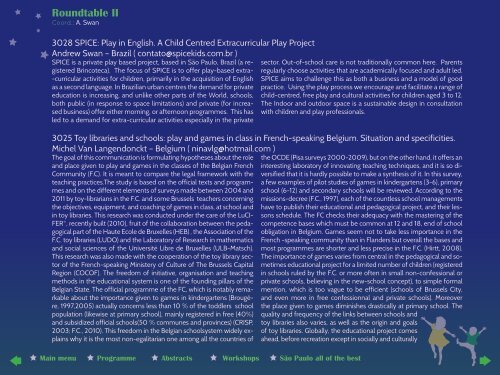Programa completo do Congresso - Associação Brasileira de ...
Programa completo do Congresso - Associação Brasileira de ...
Programa completo do Congresso - Associação Brasileira de ...
Create successful ePaper yourself
Turn your PDF publications into a flip-book with our unique Google optimized e-Paper software.
Roundtable II<br />
Coord.: A. Swan<br />
3028 SPICE: Play in English. A Child Centred Extracurricular Play Project<br />
Andrew Swan – Brazil ( contato@spicekids.com.br )<br />
SPICE is a private play based project, based in São Paulo, Brazil (a registered<br />
Brincoteca). The focus of SPICE is to offer play-based extra-<br />
-curricular activities for children, primarily in the acquisition of English<br />
as a second language. In Brazilian urban centres the <strong>de</strong>mand for private<br />
education is increasing, and unlike other parts of the World, schools,<br />
both public (in response to space limitations) and private (for increased<br />
business) offer either morning, or afternoon programmes. This has<br />
led to a <strong>de</strong>mand for extra-curricular activities especially in the private<br />
sector. Out-of-school care is not traditionally common here. Parents<br />
regularly choose activities that are aca<strong>de</strong>mically focused and adult led.<br />
SPICE aims to challenge this as both a business and a mo<strong>de</strong>l of good<br />
practice. Using the play process we encourage and facilitate a range of<br />
child-centred, free play and cultural activities for children aged 3 to 12.<br />
The In<strong>do</strong>or and out<strong>do</strong>or space is a sustainable <strong>de</strong>sign in consultation<br />
with children and play professionals.<br />
3025 Toy libraries and schools: play and games in class in French-speaking Belgium. Situation and specificities.<br />
Michel Van Langen<strong>do</strong>nckt – Belgium ( ninavlg@hotmail.com )<br />
The goal of this communication is formulating hypotheses about the role<br />
and place given to play and games in the classes of the Belgian French<br />
Community (F.C). It is meant to compare the legal framework with the<br />
teaching practices.The study is based on the official texts and programmes<br />
and on the different elements of surveys ma<strong>de</strong> between 2004 and<br />
2011 by toy-librarians in the F.C. and some Brussels teachers concerning<br />
the objectives, equipment, and coaching of games in class, at school and<br />
in toy libraries. This research was conducted un<strong>de</strong>r the care of the LuCI-<br />
FER*, recently built (2010), fruit of the collaboration between the pedagogical<br />
part of the Haute Ecole <strong>de</strong> Bruxelles (HEB) , the Association of the<br />
F.C. toy libraries (LUDO) and the Laboratory of Research in mathematics<br />
and social sciences of the Université Libre <strong>de</strong> Bruxelles (ULB-Matsch).<br />
This research was also ma<strong>de</strong> with the cooperation of the toy library sector<br />
of the French-speaking Ministery of Culture of The Brussels Capital<br />
Region (COCOF). The free<strong>do</strong>m of initiative, organisation and teaching<br />
methods in the educational system is one of the founding pillars of the<br />
Belgian State. The official programme of the FC, which is notably remarkable<br />
about the importance given to games in kin<strong>de</strong>rgartens (Brougère,<br />
1997,2005) actually concerns less than 10 % of the toddlers school<br />
population (likewise at primary school), mainly registered in free (40%)<br />
and subsidized official schools(50 % communes and provinces) (CRISP,<br />
2003; F.C., 2010). This free<strong>do</strong>m in the Belgian schoolsystem wi<strong>de</strong>ly explains<br />
why it is the most non-egalitarian one among all the countries of<br />
the OCDE (Pisa surveys 2000-2009), but on the other hand, it offers an<br />
interesting laboratory of innovating teaching techniques, and it is so diversified<br />
that it is hardly possible to make a synthesis of it. In this survey,<br />
a few examples of pilot studies of games in kin<strong>de</strong>rgartens (3-6), primary<br />
school (6-12) and secondary schools will be reviewed. According to the<br />
missions-<strong>de</strong>cree (F.C., 1997), each of the countless school managements<br />
have to publish their educational and pedagogical project, and their lessons<br />
schedule. The FC checks their a<strong>de</strong>quacy with the mastering of the<br />
competence bases which must be common at 12 and 18, end of school<br />
obligation in Belgium. Games seem not to take less importance in the<br />
French -speaking community than in Flan<strong>de</strong>rs but overall the bases and<br />
most programmes are shorter and less precise in the F.C. (Hirtt, 2008).<br />
The importance of games varies from central in the pedagogical and sometimes<br />
educational project for a limited number of children (registered<br />
in schools ruled by the F.C. or more often in small non-confessional or<br />
private schools, believing in the new-school concept), to simple formal<br />
mention, which is too vague to be efficient (schools of Brussels City,<br />
and even more in free confessionnal and private schools). Moreover<br />
the place given to games diminishes drastically at primary school. The<br />
quality and frequency of the links between schools and<br />
toy libraries also varies, as well as the origin and goals<br />
of toy libraries. Globally, the educational project comes<br />
ahead, before recreation except in socially and culturally<br />
Main menu Programme Abstracts Workshops São Paulo all of the best


